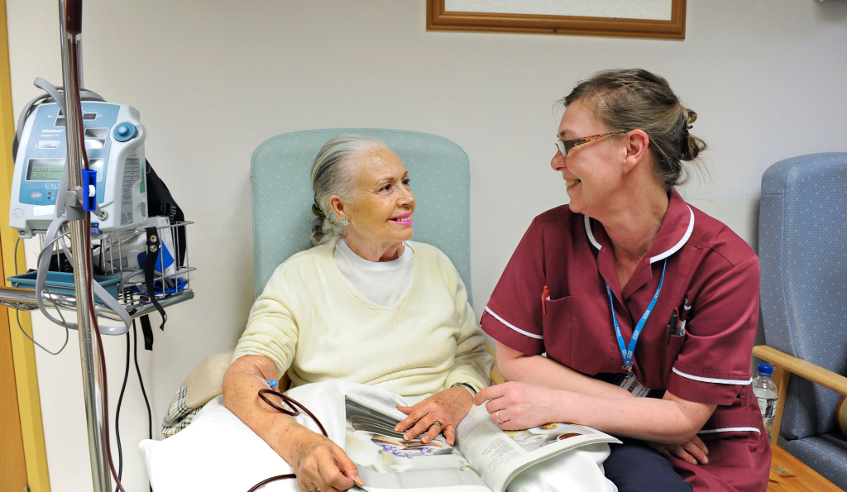
A patient and nurse at the Royal Marsden Hospital.
The Institute of Cancer Research, London, is one of the world's most influential cancer research institutes. Since we were founded in 1909, our researchers have helped to transform our understanding of cancer and how it can be treated in ever smarter, kinder ways to improve patient lives.
Our researchers today discover more new cancer drugs than any other academic centre in the world – truly living up to their mission to make the discoveries that defeat cancer.
As an organisation, we are committed to dedicating our resource and expertise to speed up the progress against cancer, and to maximise the benefit our research has for cancer patients and their loved ones.
A proven record of drug discovery
The impact of our discoveries on cancer patients lives’ is profound. We were the first to discover that damage to DNA causes cancer, and we were the first in Europe to discover and develop chemotherapies, some of which are still in use today.
We are the world-leading academic centre for drug discovery – since 2005, the ICR has discovered 20 drug candidates, 10 of which have progressed into phase one clinical trials or further.
Amongst our major drug discoveries is the prostate cancer drug abiraterone, which is now benefiting hundreds of thousands of men with advanced prostate cancer around the world.
We‘ve been improving the lives of cancer patients worldwide for over 100 years. Right here in London – in Chelsea and in Sutton – the discoveries in our labs have played an important role in shaping modern understanding of cancer and how it can be treated.
Find out more
Improving cancer patients quality of life
Our discovery of the BRCA2 gene led us to develop new forms of therapy for BRCA-associated breast and ovarian cancers, like the drug olaparib. Olaparib has had a transformative impact on the lives of thousands of women, including cancer survivor Sue Vincent, who was diagnosed with advanced ovarian cancer in 2007.
Chemotherapy had failed for Sue, and she was told her options were running out. However, seven years on from when she was first offered access to olaparib as part of a clinical trial. Sue says:
“Taking the drugs now for seven years has meant I’ve seen four grandchildren born and had the opportunity to take an active part in their lives. It has allowed me to go back to the gym, to build a successful business and given me a quality of life that I could only dream of.”
In 2017, the ICR’s drug discovery work was recognised for its benefits for people with cancer around the world with a highly prestigious Queen’s Anniversary Prize.
Using cutting edge innovations to better understand cancer
To help us better understand cancer, and why it develops, evolves and adapts – we are harnessing advanced technologies and the opportunities they bring.
Our researchers are using the latest tech in their efforts to defeat cancer – from the latest in mass spectrometry equipment, to a state-of-the-art lattice light sheet microscope, which was funded in part by donations from our supporters.
We are also leading in applying cryo-electron microscopy – a Nobel Prize winning technology – to learn more about the structures of our cells and fundamental processes in cancer, in work which could ultimately lead to new treatments.
By looking in minute detail at molecular machines within cells and how they work, our scientists aim to discover weaknesses in cancer cells that could be targeted by the next generation of drugs.
We are also driving the use of Big Data to analyse the genetics of thousands of patients with cancer to identify new lines of attack - for new potential drugs - across different cancer types.
Developing kinder, smarter treatments
New technologies are also allowing us to develop treatment strategies that will allow clinicians to treat patients with unparalleled levels of control and precision – and without the need for invasive surgery.
We are leading the development of blood tests called liquid biopsies in trials of breast and prostate cancer patients, to track changes in tumours and show whether a patient is responding to treatment. Liquid biopsies are relatively quick and easy to administer, as well as providing high levels of accuracy.
Our researchers are also pioneering improvements to radiotherapy, including by exploring how we can harness imaging technology more effectively as a diagnostic and therapeutic tool.
Together with our hospital partner The Royal Marsden NHS Foundation Trust, we are developing real-time image-guided radiotherapy treatment using the MR Linac. This is a new type of radiotherapy machine, which allows clinicians to account for the movement of a tumour in the body – for example as a patient breathes – when delivering treatment.
Currently being tested for the first time in patients, the machine will transform radiotherapy by targeting treatment more precisely than ever before, protecting surrounding healthy tissues when delivering treatment.
Help us make the next discovery
We are a charity as well as a research institute, and none of this ground-breaking work would be possible without our supporters. Their generosity helps us to keep up our vital work and to make a real impact on the lives of cancer patients.
There are many different ways you can support us – from a single one-off donation, to donating to one of our appeals, to running a marathon!
You can also learn more about the ICR and our discoveries by signing up to our biannual newsletter Search to keep up to date with our latest news, research and opportunities to support our work.
Thank you, from all of us here at the ICR.
comments powered by